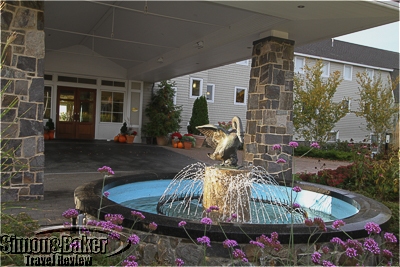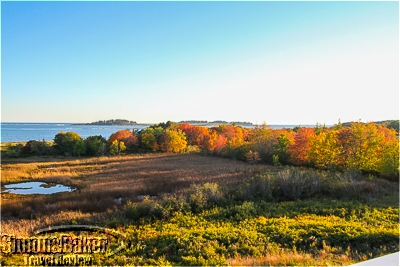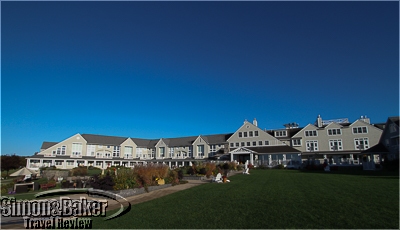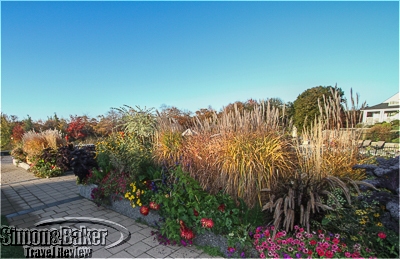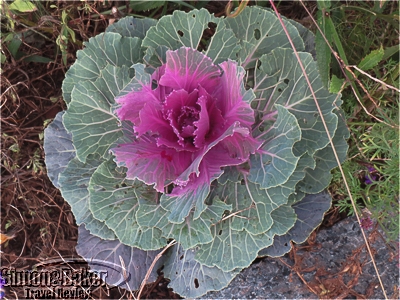Maine coastal property a stand out for luxury and responsible tourism practices
By Elena del Valle
Photos by Gary Cox
The entrance to the Inn by the Sea
During a fall visit to Maine we spent three nights at the Inn by the Sea, a boutique 61-room beach facing hotel in Cape Elizabeth south of Portland. We liked the inn’s location in a quiet residential area close enough to Portland for visits yet distant from city traffic and noise. We loved our well appointed two-bedroom suite with wonderful fall coastal views. We enjoyed the lovingly tended manicured grounds and Spa at Inn by the Sea in particular.
I liked the spa’s use of natural marine products like sea salt, algae and seaweed, essential oils and coastal themed treatments. In addition, we appreciated the property’s approach to responsible tourism, blending luxury, service and an exceptional guest stay with sustainability, and minimizing the impact of hotel operations with eco friendly initiatives and local sourcing.
The fall colors in all their glory (click to enlarge)
One example was the Inn’s landscape designed to be attractive to guests and butterflies. Inn staff focused on local plants to create ever blooming gardens and a habitat for indigenous wildlife, earning the inn a Wildlife Habitat certification from the National Wildlife Federation. Indigenous nectar gardens and milkweed were specifically planted for endangered butterflies. During the growing season, the property offered classes on How to Plant for Wildlife, and as part of the Bug’s Life Garden Tours staff taught children about local ecosystems from an insect’s viewpoint. Monarch Watch, which registers properties that provide food and shelter for the endangered monarch butterflies as they migrate through North America, certified the Inn as a Butterfly Waystation.
The living room with fireplace and kitchen of our two bedroom suite
Inn staff worked with seven local schools to provide educational programs throughout the year. In December, the Inn bought a school book from a school librarian’s list with every reservation.
The spacious grounds viewed from the back of the hotel (click to enlarge)
At the hotel restaurant, Mitchell Kaldrovich, executive chef, emphasized local produce, meat and poultry from nearby farms and Gulf of Maine fresh underutilized seafood. Working with the Gulf of Maine Research Institute (GMRI), other Portland area chefs, and a handful of knowledgeable local fishermen, he identified abundant and delectable fish from the Gulf of Maine that were under appreciated and underutilized to offer guests. The program, Out of the Blue, was meant to bring attention to plentiful seafood available in the Gulf of Maine, get better dock prices for fishermen, and help preserve the diversity and health of the Gulf of Maine. The chef was a supporter of the Root to Stock movement. Food waste was composted for later use as landscaping compost for the Inn.
The workout room was downstairs in the spa.
The property had a Silver LEED and Maine DEP Environmental Leader Green Lodging certification thanks to the integration of solar panels, recycled sheet rock walls, recycled cork floors, recycled rubber floors in the cardio room, air to air heat exchangers, dual flush toilets, heating with bio fuels, preferred hybrid parking, sheet and towel reuse programs and purchased renewable electricity.
There were plantings of vegetables and flowers (click to enlarge).
We liked the colorful plants visible along the walkways
The Inn by the Sea was active in habitat restoration. The property worked with the Maine Department of Conservation and Bureau of Parks and Land to restore habitat for the endangered New England cottontail rabbit at Crescent Beach State Park. In an effort to stop the New England cottontail from vanishing in Maine, as it had in the rest of New England, the Inn removed two acres of invasive, non indigenous plant species such as bamboo and bittersweet from state property. The Inn replanted the area with indigenous shrubs such as raspberry, blueberry, dogwood, alder, winterberry and dewberry to create a high quality, safe habitat for New England cottontails. The rabbits were named as candidates for the United States Endangered Species Act in 2006, and were listed as endangered in Maine and New Hampshire.

